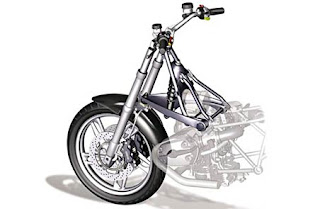BMW has a long history of "odd" suspension arrangements, and recent R1200GS models cleave to that tradition. The R1200GS model uses BMW's own (patented) 'Telelever' system, which resembles a conventional fork from a distance -- but the fork tubes basically provide only a sliding mechanical connection while springing and damping duties are handled by a central front shock/MacPherson strut.
One attribute of this system is that the top triple clamp has a somewhat different structural role. In any conventional fork arrangement, the (fixed) stanchion tube penetrates and is clamped by the top yoke. Such conventional arrangements are inherently strong. But since the Telelever setup puts less stress on that point, BMW crimps a fitting to the top of the stanchion tubes, and then attaches that fitting to the top yoke.
A problem has emerged: the fitting and the top of the stanchion tubes is clearly not strong enough for the kind of vigorous off-road use that BMW's own advertising and marketing suggest is the machine's raison d'ȇtre.
 |
| That doesn't look right. |
This has all come to light rather suddenly, in a manner that shows the power of social media when it comes to forcing manufacturers to acknowledge flaws that might otherwise be blamed on the customer.
In 2015, a South African named Tony Georgiou bought a new R1200GS. In the summer of 2016, he was riding on a relatively smooth South African gravel twin-track road when both stanchions failed, throwing him to the ground. He was injured and, though he's largely recovered, it's clear that he easily could've been killed.
When Georgiou brought the incident to the attention of BMW, initially through his local dealer, he was basically told it was his problem.
Georgiou, however, was not sap. He set up a website called BMWfatalflaw.com, which quickly gained notoriety in the ADV world. BMW was petitioned, and other GS riders reported similar stanchion tube failures. He appears in this video, which I embedded from YouTube. It's only been watched a few thousand times on YouTube, but the same video's also been shared half a million times on Facebook.
In a move that could seem cold-blooded, BMW's U.S. division was the first to ask customers to come back for this recall-that's-not-a-recall -- a move that seems to reflect the willingness of American juries to award massive settlements. Skeptical BMW owners in other countries concluded that BMW was worried about a big American court award, but not that the stanchion tube failures might injure or kill riders in other countries.
It now appears that pressure from Georgiou's online campaign will prompt BMW to repair machines no matter where they might be. According to BMW, 168,000 motorcycles are affected.
It seems likely to me that most GS owners, who use their motorcycles almost exclusively on paved roads, have nothing to worry about. Bikes that have been ridden hard off road, or on rough roads, are more likely to experience stanchion failure. That said, once the damage has been done, some stanchions wait and fail with no warning and little provocation.
GS owners who have ridden their machines off road, or who have ever had a front wheel impact hard enough to damage the wheel itself, obviously need to pay more attention to BMW's "invitation". BMW owners outside the U.S. should obviously check to ensure their national distributor and local dealer will conduct an appropriate inspection and repair, promptly and free of charge.
Business interests bitterly decry the chilling influence of huge jury awards, but in this case it seems fear of a big American lawsuit forced Motorrad to publicly acknowledge a problem that it must have been aware of for years.

Thanks for sharing this valuable information.
ReplyDeleteDiavel V4 Ducati
Ducati Monster Vehicle
Ducati Streetfighter V2
New Ducati Streetfighter V4
Ducati Multistrada V2 Price
New Multistrada V4 Ducati